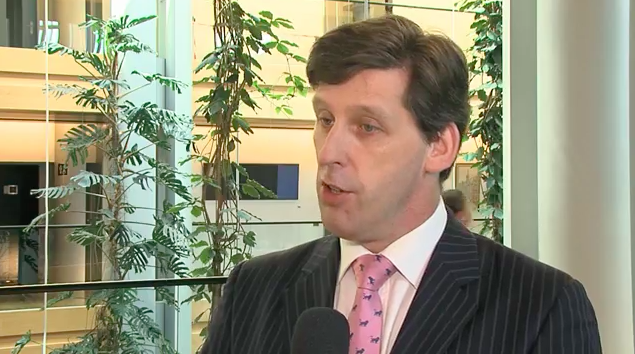I have an awkward relationship with the House of Lords. On the one hand, it regularly proves a doughty guardian of liberties against a rash, headline-chasing executive. On the other hand, it’s the House of Lords. Hereditary peers, bishops, Liberal Democrats — the clientele are a rum lot. We don’t have our constitutional troubles to seek but we might want to look at getting ourselves one of those elected upper chambers, albeit one independent of Downing Street and party managers.
Nevertheless, the Lords has its uses, and one of the most welcome is bringing experience to government. A good example is Ian Duncan, the Scottish Tory MEP who is reported to be heading for the red benches and from there to a junior ministerial post in the Scotland Office. Duncan fell 21 votes short of taking Perth and North Perthshire from the SNP’s Pete Wishart on June 8. He will now get the opportunity to serve from a different place at a time of vital importance for the UK.
Wishart has called this an ‘insult’ to his constituents, though re-electing an MP who tweets messages about opponents being ‘absolute total w****’ and ’embarrassing incontinent old relatives’ suggests they’re not easily offended. The SNP was made for complaining and it would be unsporting to deny them that meagre pleasure, miserable times as these are for Scotland’s secessionist movement.
But there’s real chutzpah in their objecting to a defeated candidate being handed a governmental sinecure. When Nationalist MSP Stewart Maxwell lost his seat in the 2016 Holyrood election, he was brought back as a special adviser on the public’s dime. And rightly so — he’s one of the sharpest thinkers in the SNP, a party which has lost too many such people of late.
Unfortunately, the Spectator’s Katy Balls has voiced similar misgivings, detecting in Duncan’s elevation ‘the whiff of a stitch-up’ and proof that, yet again, ‘Theresa May has snatched defeat from the jaws of victory’. Katy worries that this could stall the Ruth Davidson revolution, allowing opponents to dismiss the Scottish Tories as ‘an old boys’ club’. She needn’t fear. Far from an imposition from the Prime Minister, Duncan’s appointment is a sign that the Scottish Tories are well-prepared for the Brexit process — more so, indeed, than the party south of the border.
Installing someone with Duncan’s institutional knowledge in Dover House hands Scottish Secretary David Mundell an instant advantage over the SNP, to say nothing of some of his Cabinet colleagues. And while sticking a comp-educated lad raised on a council scheme by a cleaner and a mechanic into the House of Lords can be called many things, the work of an old boys’ club is not one of them.
Still, if Duncan was being handed a peerage as a consolation prize, the Nats would be well within their rights to have a go. On the contrary, he comes with an impressive CV. Before becoming an MEP, he headed the Scottish Parliament’s mission in Brussels and later worked as an adviser to Holyrood on European affairs. He was secretary of the Scottish Fishermen’s Federation, an Eastern Europe researcher for BP, and policy director for a refugee charity. There is plenty of potential among the 12 new Scottish Tory MPs but none boasts a background like that. Britain will get only one chance to make a decent fist of Brexit and the government cannot afford to be distracted by the daily howls of betrayal that will issue from the Scots Nats on fishing, farming and the rest.
For all their kvetching about Lord Duncan of Brexit, the SNP at Holyrood provides an object lesson in the perils of boosting untested members into ministerial offices. Unionists complain that independence distracts the Scottish Government from the day job — and it does — but even if Nicola Sturgeon parks her dreams of secession for a few years, her administration will still be hampered by substandard ministers. Would that Holyrood had an upper chamber of political appointees to spare us the indignity of being ruled over by Angela Constance and Shona Robison.
The idea of unelected ministers has never sat easily with me but Ian Duncan is a better advertisement than most for their utility – in the short term, at least. If we must have a House of Lords, better that it be used to bring wisdom and a calm temperament to government. We’re going to need a lot of both over the next few years.







Comments